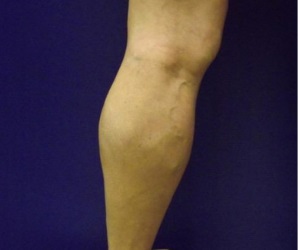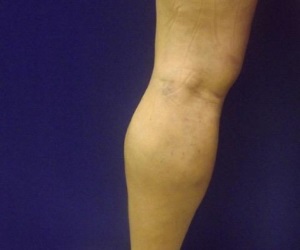How are Venous Ulcers Diagnosed?
The diagnosis for venous ulcers is relatively straightforward. To begin the treatment process, you should book a free vein screening with an expert specialist like Dr. Craig Schwartz, Kansas City’s most experienced vein specialist. This will allow Dr. Schwartz to assess your condition and visibly confirm that you possess any of the telltale signs of venous ulcers. Most notably, he will look for the following:
- Painful sores on your legs that have been there for a few weeks and aren’t going away
- Swelling around your lower legs and ankles
- Discolored or hard skin
He will provide a thorough visual examination of your leg veins, identifying any other issues that could lead to venous ulcers. For instance, varicose veins are a highly common cause of this issue, as they usually result from blood pooling and are commonly a sign that you may have venous ulcers. A couple of tests will also be conducted to ensure that your arteries are still working correctly, ruling out any issues with those main blood vessels.
3 Tips to Prevent Venous Ulcers
As with all things in life, prevention is much easier than finding a cure and treating this problem. While venous ulcer treatment is available at our vein center, Dr. Schwartz encourages everyone to take preventative steps. Here are three great tips to follow:
Wear Compression Stockings
These physician-grade compression stockings are designed to compress your lower legs and ankles. Compression socks are tight at the bottom. The compression encourages blood to flow back up through your body. It improves your circulation, stopping blood pooling from occurring. It’s typically suggested that you keep them on during the day, only removing them when you go to sleep. The office will provide you with a personal fitting to ensure proper fit. Please note that the compression socks, etc., available at running stores are not the same as prescription-grade stockings.
Lead a Healthy Lifestyle
People who lead an unhealthy, sedentary lifestyle are far more likely to suffer from venous ulcers, as inactivity can impact circulation throughout your body, particularly your legs. As such, this can lead to blood pooling.
Also, weight gain is often associated with an unhealthy lifestyle, which puts more pressure on the veins in your legs. This can cause damage to the blood vessels, leading to issues like varicose veins and venous ulcers. By living a healthy lifestyle, you can prevent these issues from happening.
Elevate Your Legs
Much like the compression stockings, elevating your legs is designed to encourage blood flow back up through your legs to your heart. In turn, this stops blood pooling and can prevent venous stasis ulcers.
Treat Your Varicose Veins Veins
As noted above, varicose veins often developed when blood pools (the ultimate cause of venous ulcers). By treating your varicose veins, you will prevent any future ulcers from possibly developing.




